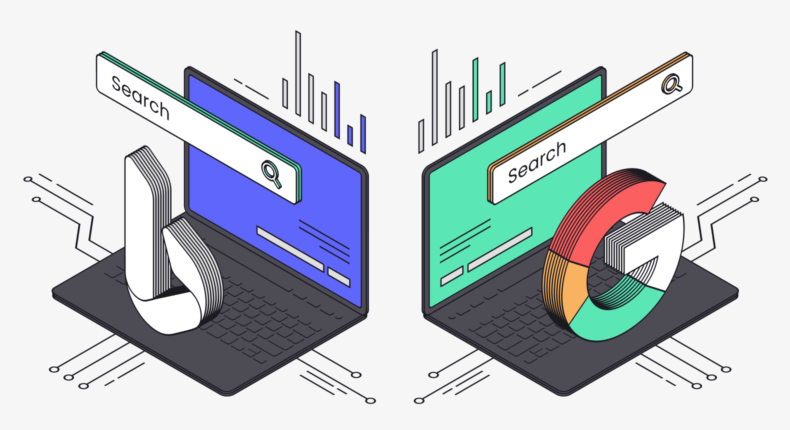Table of Contents
Although it has a more than 92% share of the global search engine market, Google wasn’t the first search engine ever created, and it certainly wasn’t the last. In 2006, eight years after Google initially launched, Bing came onto the scene and quickly became the second-largest competitor in the field.
Aside from offering searchers access to valuable information and resources, Google and Bing serve as major marketing platforms for businesses of all sizes. While these different search engines share similar features, they each have unique specialties when it comes to digital marketing. As a webmaster, it’s important to understand the strengths of each platform before deciding where to focus your energy.
Google vs Bing search
Just like it’s hard to buy a house without touring it first, you can’t choose which search engine is better for your needs without looking at the services they offer.
Google and Bing both have a wide range of tools and service options to consider. From their privacy approaches to the quality of their search services, there are many criteria you can evaluate to determine the best platform for your brand.
Bing vs Google market share
Google commands the largest search engine market share while Bing holds a 2.5% share. This figure jumps to 3.9% globally if you consider that Bing also powers Yahoo searches.

Formerly known as MSN Search and then Windows Live Search, Bing has made consistent improvements year over year in order to grow its reach. Since rebranding in 2009, Bing has seen an increase in its share of total desktop searches:

This may be due to the installation of Microsoft Edge on PC computers (Apple computers use Safari powered by Google).
On console searches through Xbox, Bing also has a larger share of the market at roughly 27%:
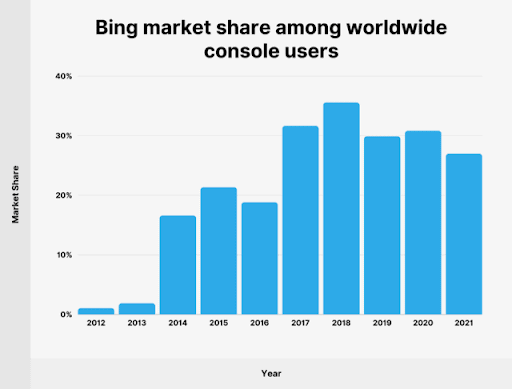
In China, where Google has had issues dealing with censorship laws and search engine regulations, Bing has a larger market share (although both platforms fall in the “other” category):
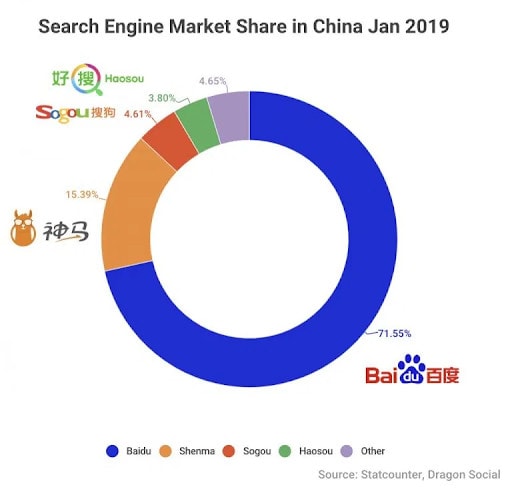
As mobile search begins to grow and users demand new features along with faster load speeds, industry dynamics consistently shift. While Google search remains the largest player worldwide, Bing commands an almost double or triple market share in some regions than it does in others.
A two to three percent market share may seem small, but when you consider that there are billions of searches per day, Bing is too big to ignore.
Bing vs Google usage
With more than 90% market share in North America, South America, Oceania, and Africa, Google users are extremely diverse. Because of its reach, Google provides access to every possible demographic. On the other side, however, the sheer amount of users that use Google make it a highly competitive space for businesses to advertise.
Google Shopping has a larger reach than Bing’s shopping features, given its dominance of mobile search activity. In fact, mobile searches now represent more than 60% of Google’s total organic search results. Meanwhile, only 23% of Bing’s results come from mobile searches.
While Google is the most obvious and popular choice among users in the West, Bing has many niche audiences that it commands.
All Microsoft Office products include Bing search features and they come pre-installed on most laptops and desktop computers. The overall desktop usage by operating system (OS) gives more insight into Bing’s reach:
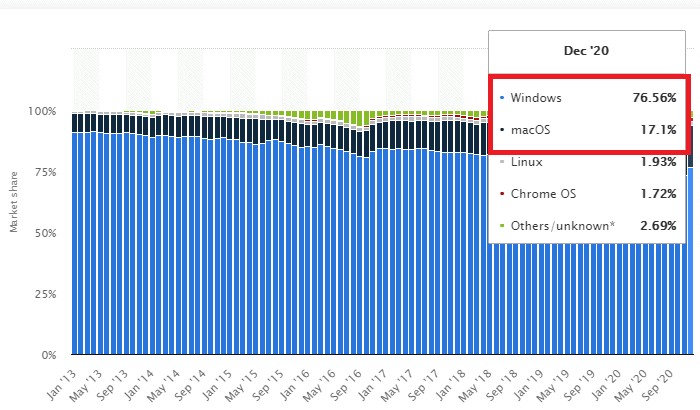
With Bing search installed on Windows OS, it’s evident that desktop users at corporate offices are more prone by default to use Bing search. Bing has a more specific target demographic than Google:
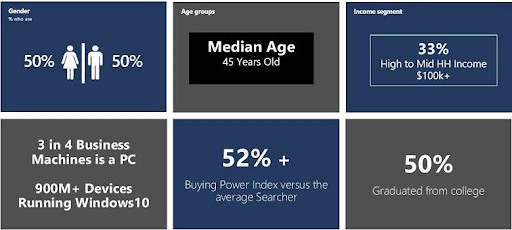
These searchers are most likely accessing Bing results pages from work computers, and they are more likely to have college degrees and higher incomes than the average Google user.
Here are some popular sites and resources powered by Bing:
- Amazon Kindle, Alexa, and Echo devices
- Apple’s “Siri” technology
- Xbox
- Skype
- Gumtree
- Amazon.com
- OfferUp
Its integration with Amazon gives Bing more influence on overall shopping search results, even though Google still has a bigger lead. With both Siri and Alexa using Bing to return user queries, Bing also has more influence over the voice search market, which is no small feat considering the trajectory of search.
Google vs Bing ranking algorithm
While Google does give insight into the structure of its algorithm, it is more secretive than Bing. You may have to read SEO case studies, guides, and industry studies (or conduct your own) to figure out the most effective optimization strategies.
Google follows a mobile-first indexing process which means that the mobile version of a website is the most important for ranking purposes. Some of the most important SEO techniques for Google include:
- Keyword usage (content, title tag, url, etc.)
- Backlink building
- Page speed optimization
- Mobile-friendly web design
- Content relevancy and quality (satisfying user intent)
The AI technology that powers Google’s search function is capable of analyzing a search query in a sophisticated manner. It uses context clues to interpret semantic search terms and provide the most relevant content possible.
When it comes to its search algorithm, Bing is much more transparent than Google. With a published set of SEO best practices and guidelines, Bing makes optimization easier for marketers who want to improve their rankings on its SERPs.
Here are some of the main differences in how Bing ranks web pages:
- Focuses on high-quality backlinks vs. quantity
- Prefers official domains like .gov and .edu over commercial domains
- Puts more emphasis on social signals for ranking
- Treats older websites as more credible
- Uses click metrics to inform rankings
While the two search engines ultimately focus on different top criteria, they have many similarities. Both use an extensive database of content to decide which web pages rank for each search term. And although the particular ranking order may change across Bing and Google, the goal of both search engines is to deliver high-quality SEO content to users.
Bing vs Google privacy
Unlike DuckDuckGo, which doesn’t collect user data or run personalized ad campaigns, Google and Bing store user data to improve and personalize search results.
Google’s overall size is one of its biggest downfalls when it comes to protecting sensitive information. Because the service shares user data across all of its proprietary apps, tools, resources, and websites, users are at greater risk of compromised privacy. On the other hand, Microsoft has less integration among its tools and resources, which are far fewer than the tools and resources Google claims in its suite.
While Bing has less transfer of user data than Google, both search engines collect and store user data to try and improve the search experience. They both default to HTTPS encryption to protect users as they navigate to other sites, however, you should still purchase and install an SSL certificate to ensure your visitors’ safety on your site.
Bing vs Google ads
Unlike the search experience, there are many more differences between advertising on Google and Bing. Both platforms offer pay-per-click (PPC) ad services. On the whole, Microsoft Advertising (aka Bing Ads) is less expensive than Google Ads, largely driven by the affordability of its cost-per-click (CPC) prices.
Some research has shown that advertising costs for Bing are usually 20 to 30% lower than they are on Google. Although Microsoft Advertising has a smaller audience, its campaigns tend can still have higher click-through rates (CTRs) and lower CPCs:

Google Ads (formerly Google Adwords) provides a larger potential audience because of its overall market share. Meanwhile, Microsoft Advertising reaches users on Bing, Yahoo, and AOL services. Plus, Microsoft owns LinkedIn, giving advertisers access to specific audiences based on profile information (age, gender, niche, etc.) from the social network.
Digital marketing experts and SEO consultants typically recommend a mixture of both advertising platforms for the most effective strategy. Many businesses choose to focus on Google Ads (because of its massive audience) while also running ads across Bing and its partners for the biggest reach possible.
Google vs Bing maps
With more than 154 million monthly users, Google Maps is by far the largest map technology out there. It is the default app on all Android devices and many iPhone users opt to download it in favor of Apple Maps. But when it comes to providing location information, businesses should be adding their details to every map service available.
Successful local SEO strategies depend on the map features that Google and Bing offer. In terms of functionality, these two offerings have many similarities. They both include:
- Knowledge panel (which can include business details)
- Zoom capabilities
- Filters for things like avoiding tolls and highways
- Directions via car, bus, and walking
- Feature to save important destinations
You may see some differences between the directions themselves, as Google appears to have a different calculation method that adds a few extra minutes to routes.
As far as local search SEO goes, both map features make it easy for users to find businesses in their area. Google Maps search results show options in a more narrow view, trying to find the closest businesses that are relevant to the query. Bing displays results on a wider map, organizing results by relevance over proximity.
From a business standpoint, it’s important to claim your listings on both platforms. Customers should be able to locate you on the map if you operate a brick-and-mortar location. When you don’t have your site, location, and contact information available on Google Maps or Bing Maps, you greatly reduce the chances that customers will visit in-person.
Bing vs Google test
One study compared the CTR of top-ranking posts on both search engines to determine how well they engage users. The results found that Google results had greater CTRs, suggesting that Bing users simply click less.
Another comparison found that Bing ads perform better on a CPC basis, but that Google ads have better conversion rates.

Another research study tracked eye movement on both platforms and compared them side-by-side to see how users interacted with the content in the SERPs. They found that users looked at ads on Bing 150% more than they looked at Google ads. It also found that the users preferred the design of Bing’s results pages over Google’s.
If you want to check your SEO visibility on Google and Bing, use the SERP Checker from SPYSERP. It lets you analyze your rankings on both platforms (plus Yandex and Yahoo) and helps you find keyword and niche opportunities for growth.
Is Google or Bing better?
Choosing a winner in the search engine debate is difficult because both competitors have their own strengths and areas of opportunity. While any website can benefit from a strong SEO strategy on either platform, Google is better for some businesses while Bing is better for others.
Why Bing is better than Google
Bing, although comparatively much smaller than Google, is an excellent place for small businesses to outperform their competition. Because their map features are so similar and because Bing is often overlooked by many businesses, you have a better opportunity to ranks as an industry leader.
Small business SEO strategies focus on ways to make an impact without overspending. Bing’s lower advertising costs and potential for higher CTRs are enticing to businesses with smaller budgets. Additionally, many small businesses use free social media platforms like Facebook and Twitter to promote their offerings, and Bing puts more emphasis on these factors than Google does.
Why Google is better than Bing
Google is ideal for ecommerce sites that service customers from anywhere. Because it has such a massive market share, you are more likely to not only generate a larger audience, but you’re more likely to attract your very specific target audience niche if you implement SEO best practices on your website.
Incorporating Google SEO in your overall marketing strategy is also effective if you are targeting long-tail keywords. Since the Google algorithm is better at interpreting semantic search terms and understanding user intent, it is more likely to properly rank content based around complex keywords.
Bing vs Google statistics
One of the easiest ways to analyze the pros and cons of Google and Bing is to look at some of the data surrounding their services, reach, and growth potential. Here are 10 statistics that you should know about both of these platforms:
- In Q1 of 2020, Google accounted for 96% of mobile search results while Bing only accounted for 1.4%.
- Advertising budgets on Bing are 20-35% smaller than on Google Ads.
- 33% of Bing users have an annual income over $100,000.
- 47% of paid search clicks in the healthcare sector come from Bing.
- Google processes more than 1.2 trillion searches per year.
- 98% of search engine users have tried Google while 76% have tried Bing.
- Half of all product searches start on Amazon, not on Google search.
- In 2019, 52% of consumers used voice search technology powered by Bing to conduct product research.
- The number of unique monthly visitors on Bing increased by 6% between 2019 and 2020.
- From 2010 to 2021, Google had 86.6% of global desktop traffic while Bing and its partner Yahoo had a 9.41% market share.
Get a complimentary SEO audit
The search engine market will be impacted in coming years by the growth of voice search and ecommerce sales, and Siri and Alexa both use Bing. While Google offers a larger potential audience, Bing offers less expensive advertising services. Contrasting these and other factors against the needs of your own brand will ultimately help you decide which platform better suits your business strategy.
Want to see how you’re doing with SEO? Get an instant SEO audit below. Or, schedule a free consultation to see how intent SEO can boost search traffic revenue by 700%.
